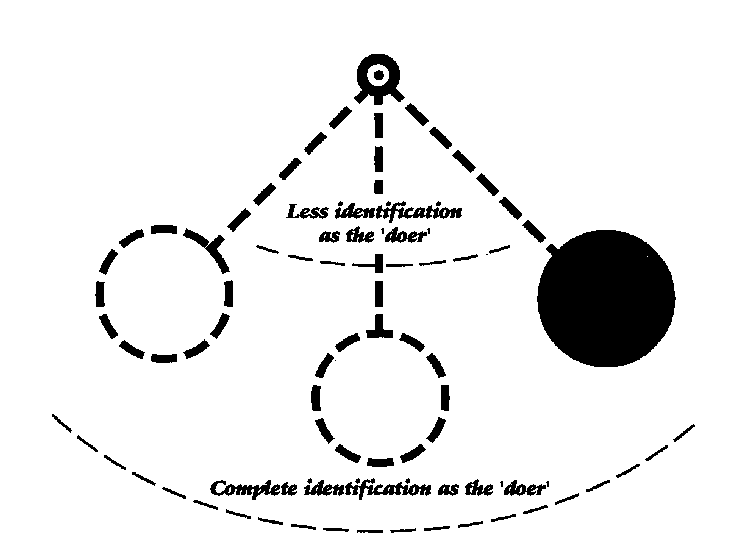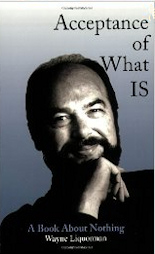
Well, I have a model—a visual aid, as it were— that speaks to precisely this process. Basically the model is that this movement is like a pendulum movement, the movement between polaric opposites, between happiness and sadness, between satisfaction and dissatisfaction, between getting what you want and not getting what you want, between health and sickness. Life is a movement between these polaric opposites. And it's continual.
If you're identified completely as the doer of your actions then you're riding at the very tip of this pendulum, such that when things are going well, you're ecstatic, and when things are going poorly, you're miserable. When you're healthy, you're happy. When you're sick, it's horrendous. When you're getting what you want, you're delighted. And when you're not getting what you want, you're absolutely miserable. This is the state of most people. There's just this huge swinging back and forth between the polaric opposites.
Now, with some individuals, at some point in this process, there comes a moment, and they may not even recognize it, but a moment comes when there is a sense that maybe, just perhaps, I am not the center of the universe. Perhaps I am not the end all and be all of everything. Maybe there's something more. Maybe there is something operative in the universe other than me. And that is the point at which there is a dislocation from this total sense of personal doership, from the sense that, "I'm the one who's doing this." That's the point that the sage, Ramana Maharshi, says, "Your head goes into the tiger's mouth, the jaws close, and there's no escape." You are now a seeker. So begins this process of seeking to know what is the functional element in the universe. "If I'm not it, if...maybe...just (laughs) assuming for a millisecond that maybe I'm not it, then what is?" And that begins this process of seeking, which is a process of disidentification as the doer.
The increased sense of disidentification as the doer is, figuratively speaking, a movement up the pendulum shaft. Now the same stuff happens in life. Good stuff happens, bad stuff happens. But notice, if you're identified up the shaft, your subjective movement in this swing—the way it seems—is much smaller. You are moved in a much smaller arc, because there isn't this sense that I am doing it. There is more of a sense that this is all happening, that I'm an instrument through which this is happening.
And occasionally, on your really good days, like the really good days, there's a movement to the very top of the pendulum shaft, and then life and living is going on, and you are totally unmoved by it all. There is pure witnessing of all that's happening. There is a sense (and I know that you've experienced it), a sense of impersonal connection with everything, and in it the Oneness is palpable. That all this life and living is just going on. It's going on perfectly. It's going on precisely the way it's supposed to be going on. There's utter and complete peace. And it doesn't get any better than that! That's as good as it gets, phenomenally speaking. You are one with the universe! What could be better than that?
This experience may last five minutes, or ten minutes, or a day, or a week. Maybe it'll last a month, or six months. If you're very, very lucky it could last quite a while. But what's crucial to understand is that this experience at the very top of the pendulum is an experience in phenomenality, even though it's impersonal. It is still an experience. It has substance. It has characteristics. You can say it's great. Therefore, there's something there. That means it exists in phenomenality. And anything that exists in phenomenality has one basic quality to it: it's subject to change, it will change. It carries within itself the very seed of its opposite.
And the change is tragic. The change is awful. What is revealed is that this is, in fact, a greased pendulum shaft. You find that you have slid back down into involvement. And now you're swinging again. Now you're suffering again. Now you have the conviction that you're the doer again, despite all the intellectual premises to the contrary. I mean, you've been to all the talks, you've read all the books, you know that you're not the doer, but the experience is of personal doership. The experience is I'm doing it.
Now that experience, having just come from a state of impersonal witnessing of All That Is, is awful. It is experienced as a fall from Grace. The great Christian mystic, St. John of The Cross, describes this as the long, dark night of the soul. He had the experience of being one with God, and he wrote about it very eloquently, He was connected. He was at one with all that was. And then he slid down the pendulum shaft. He didn't put it that way, (laughter) but that was his experience. What
he actually said was that God had abandoned him. He felt as if he had been abandoned by God. And he went into a horrible depression. He was absolutely nonfunctional. Today they lock you up for a few days, give you some pills, and send you on your way. But then, they didn't have those luxuries.
The Impersonal Awakening is not this point at the top of the pendulum shaft. That is a point in phenomenality. That is a point that's subject to change. There will always be movement in and out of that state. It is a state in phenomenality. It is subject to change. What all the sages have been pointing towards is the quantum shift and it's a total paradigm shift, from identification anywhere on the pendulum shaft, to identification at the fulcrum.
Now the fulcrum is that upon which the pendulum moves. The fulcrum is crucial to all the movement. Without it there's no movement. But the thing about the fulcrum is that nothing happens there. There is no movement there. There is nothing going on. There is no subject-object relationship, which is what movement is. There is just the Oneness. In the Oneness there is no feature. If there is no feature, there's nothing to experience, and no one to experience it. And that can be said to be the state of the sage.
|








